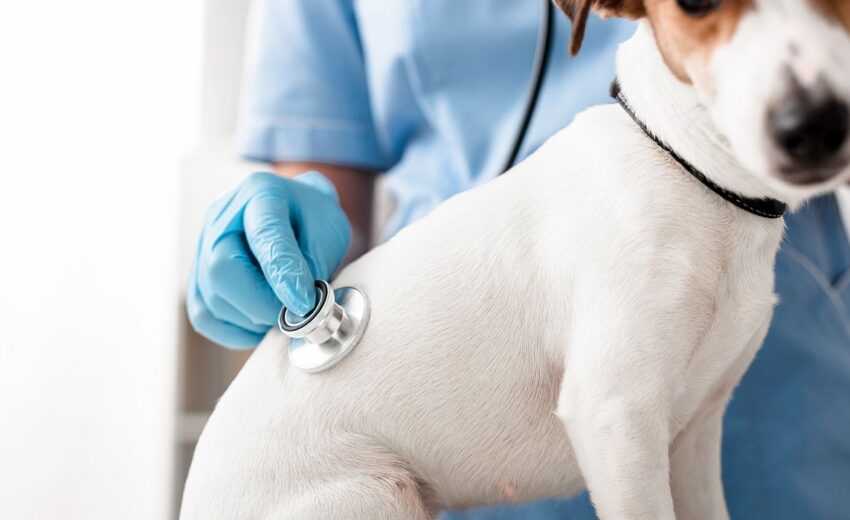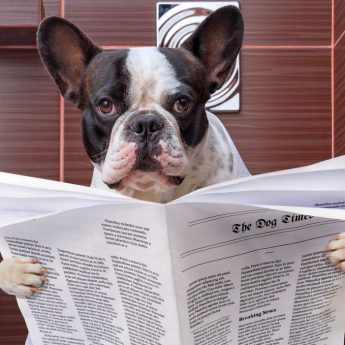Is Spot’s stomach making noises? Just like us, our dogs may occasionally have noisy stomachs due to a variety of factors.
Luckily, this isn’t a cause for concern under most circumstances — minor stomach gurgling is usually a normal part of canine biology. However, you need to know when it is normal and when it isn’t to protect your pooch.
We’ll help you learn how to make that distinction below and share some of the reasons why your canine companion’s stomach might be particularly vocal.
Key Takeaways: Why Is My Dog’s Stomach Making Noises?
- It is pretty common for a dog’s stomach to make noises from time to time. As long as the noises only occur occasionally, and your dog is not demonstrating any other troubling symptoms., it’s usually no cause for concern — a wait-and-see approach is usually prudent.
- Hunger, gas, and general tummy upset are some of the most common causes of stomach noises in dogs. However, there are a few more concerning issues that may be at play, including things like liver issues and (very rarely) cancer.
- Contact your vet if your dog’s stomach makes noises frequently or if the noises are accompanied by other symptoms. Not only do you want to rule out serious problems, but you’ll also want to do everything you can to keep your dog as comfortable as possible.
Common Causes for Your Dog’s Stomach to Make Noise

Dog stomach noises are technically known as borborygmi (singular: borborygmus), and they could be caused by a number of things.
Here are some of the more common reasons why your pup’s stomach may be making noise.
- Hunger — One of the more benign causes of stomach noises is simply hunger. If your furry friend hasn’t eaten in a while, his tummy might be trying to tell you something. For some dogs, it may be better to serve several small meals throughout the day instead of one or two large ones to cut down on intermittent bouts of hunger.
- Gas — When gas moves from one portion of the intestines to the other, it can produce a noise. These sounds are oftentimes relatively unnoticeable, but some foods may be harder for your dog’s digestive tract to handle, leading to louder tummy rumblings. If you notice that your dog becomes suddenly gassy after eating a certain type of food, it might be a good idea to cut out that food or serve it in more limited quantities. You could also consider switching to a dog food for gassy dogs, as these foods often feature probiotics and other additives that can easy gassy tummies.
- Too Much Air — Your pooch may have ingested too much air during an exciting play session, while drinking large quantities of water, or while scarfing down his breakfast. This can lead to more tummy rumblings or burps, and may be a sign that it’s time to find Fido a slow feeder. This isn’t something to ignore, as swallowing air can also put your dog at risk of bloat or GDV, which are very serious medical emergencies.
- Your Dog Ate Something Questionable — Excess noise could be a sign that your dog’s system is having trouble processing whatever was eaten last. This could be questionable food choice or even food that’s potentially dangerous for your furry friend. If your dog doesn’t exhibit any other symptoms, he’ll probably be fine, but consult your vet if you notice any other issues (especially things like lethargy, lack of coordination, or hyperactivity) or you’re worried.
- Impending Diarrhea — Your dog’s loud stomach noises could be a warning call that Fido has got to go (like, now). It’s a good idea to take your pooch outside after noticing any loud stomach noises just in case they’re indicative of impending dog diarrhea. After your furry friend is feeling better, try to identify the underlying cause of the digestive upset and give your vet a call.
- Ingested Foreign Body — Dogs frequently get into things they shouldn’t, ranging from underpants to aluminum foil to plastic. So, it’s possible that your dog’s system is trying to deal with an ingested foreign body. If you suspect your dog ate something inedible, call your veterinarian immediately to determine the best course of action.
- Inflammatory Bowel Disease — Dogs with inflammatory bowel disease or IBD are more likely to have stomach upset, which can lead to regular stomach rumblings. Recurrent loud stomach noises should always be checked out by a pet professional to rule out any serious underlying disease(s).
- Intestinal Parasites — Intestinal parasites like roundworms, hookworms, whipworms, and tapeworms can cause excessive gas and inflammation, leading to alarming tummy noises. Once your pooch has been successfully de-wormed per your veterinarian’s advice, you’ll want to stay up to date on periodic dog deworming medication to lower your mutt’s risk of reinfection.
- Small Intestinal Bacterial Overgrowth (SIBO) — A condition that occurs when bacteria begin proliferating in your pup’s small intestines, this ailment can cause several symptoms, including flatulence and stomach noises. If your vet suspects that this is the cause of your pet’s tummy noises, he or she will likely prescribe a course of long-term antibiotics and probiotics.
- Poor-Quality Food — Dogs who’re fed low-quality foods (especially those with unnecessarily high carbohydrate content) will often have noisy stomachs. In such cases, the noises are often caused by excessive fermentation of the bacteria and fungi living in your dog’s digestive tract, which leads to gas. This is part of the reason it’s important to select a high-quality food for your dog.
- Liver Issues — If your pooch has a metabolic issue, such as those relating to the liver, abnormal stomach noises may be a more frequent occurrence. Other related symptoms include changes in appetite, excessive thirst, vomiting, and diarrhea.
- Cancer — Though very unlikely, abnormal stomach noises could be a sign of intestinal cancer. This is part of the reason it’s important to consult your vet if your dog’s tummy sounds continue to occur over time.
Don’t have easy access to a vet? You may want to consider getting help from JustAnswer — a service that provides instant virtual-chat access to a certified vet online.
You can discuss the issue with them, and even share video or photos if need be. The online vet can help you determine what your next steps should be.
While talking with your own vet — who understands the ins and outs of your dog’s history — is probably ideal, JustAnswer is a good backup option.
Do Stomach Noises Cause Your Dog Pain? What About Discomfort?

We can’t ever know about the inner experiences of our dogs with certainty, but it is very unlikely that run-of-the-mill tummy noises cause your dog any significant pain that needs to be treated.
Just like humans, our dogs likely take these gurgles and glugs in stride.
That said, some of the issues that cause stomach noises — such as hunger, intestinal distress, or cancer — can certainly cause pain or discomfort. So, you’ll want to identify the cause of the canine cacophony, so you can address the issue and help your pupper feel his best.
Dog Stomach Noises: When Do You Need to Worry?
Hearing your dog’s stomach make more noises than usual can be alarming, but most of the time, this can be attributed to a simple case of gas or hunger. If your dog is otherwise acting fine and eating and pooping normally, he’s likely OK.
However, if your dog’s stomach is always making noise (or it’s just frequent), a trip to the vet is in order.
Also, make sure you take note of any foods or actions that may trigger stomach upset in your furry friend.
Any symptoms should be shared with the veterinarian in order to pin down the most accurate diagnosis. You’ll also want to bring a fecal sample with you to help determine the underlying issue.

If your furry friend is experiencing any of the following symptoms accompanied by tummy rumblings, call your vet at once:
- Lethargy
- Hypersalivation (aka excessive drooling)
- Changes in appetite
- Abdominal Pain
- Stool discoloration
- Small, white segments in a dog’s stool (this usually indicates a tapeworm infection)
- Diarrhea that lasts longer than a day
- Constipation
- Blood or mucus in the stool
- Vomiting
***
Thankfully, a rumbling stomach doesn’t necessarily warrant cause for concern for your pooch. Just remember to keep an eye out for other distinguishing symptoms and if you’re ever in doubt, be sure to give your veterinarian a call.
Has your pooch suffered from an upset tummy? What makes him feel better? We’d love to hear all about it in the comments below!









No Comments